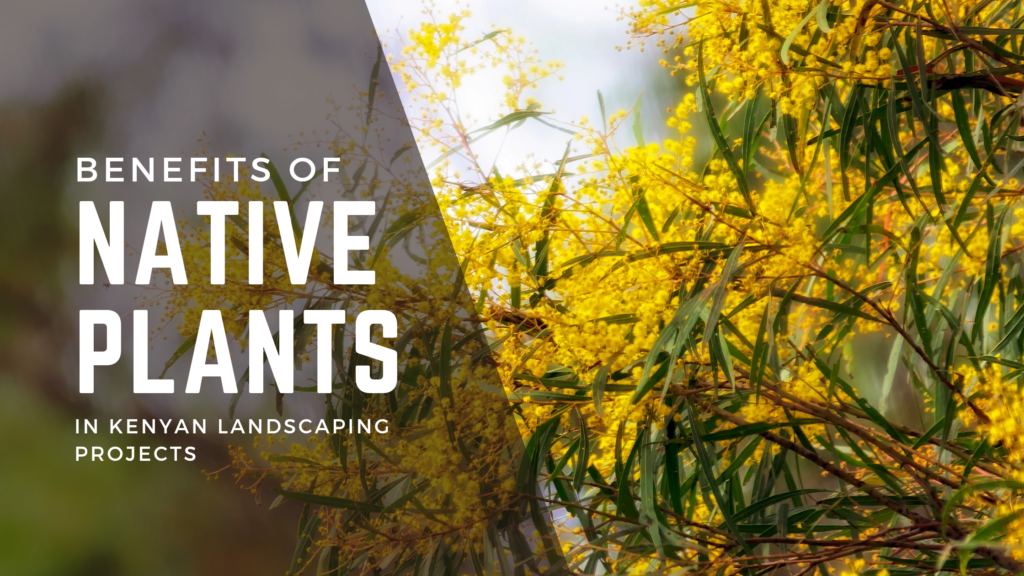The Benefits of Native Plants in Kenyan Landscaping Projects

Incorporating native plants into landscaping projects is a growing trend, especially in regions like Kenya where biodiversity is rich and the climate varies widely. Native plants, which are naturally adapted to local conditions, offer a range of ecological, economic, and aesthetic benefits that make them ideal for sustainable landscaping. Here are some key advantages of using native plants in Kenyan landscaping projects.
1. Low Maintenance and Cost-Effective
Native plants are well-suited to Kenya’s diverse climates and soil types, which means they require less maintenance than non-native species. They’re naturally adapted to local weather patterns, including periods of drought or heavy rain, making them resilient and easier to care for. By reducing the need for fertilizers, pesticides, and frequent watering, native plants save time, money, and resources for property owners.
2. Drought Tolerance and Water Conservation
Kenya experiences both rainy and dry seasons, making water conservation essential in landscaping. Many native plants, such as succulents and grasses, are drought-tolerant, requiring minimal watering to survive. Using these plants helps conserve water, an increasingly valuable resource in urban and rural areas alike, especially during dry spells. This is not only eco-friendly but also reduces water costs significantly.
3. Support for Local Wildlife and Biodiversity
Native plants provide food, shelter, and breeding grounds for local wildlife, including birds, bees, butterflies, and other pollinators. By choosing native plants, you help preserve Kenya’s biodiversity, supporting healthy ecosystems and maintaining balanced food chains. Pollinator-friendly plants like Aloe vera, Wild sage, and various Acacia species attract and sustain local pollinators, which are essential for agriculture and natural habitats.
4. Reduced Need for Chemical Pesticides and Fertilizers
Native plants are naturally resistant to local pests and diseases, which reduces the need for chemical pesticides. This minimizes soil and water contamination, promoting a healthier environment. Additionally, they typically don’t require heavy fertilization, as they are adapted to the nutrient composition of the local soil. Reduced chemical use is beneficial for both human health and wildlife in the area.
5. Prevention of Soil Erosion
With strong root systems suited to local soils, native plants help prevent soil erosion, particularly on slopes or areas prone to heavy rain. Plants like Vetiver grass and various indigenous shrubs have deep roots that stabilize soil and reduce runoff. By preventing erosion, these plants help maintain healthy soil, support water quality, and protect the landscape from degradation.
6. Preservation of Kenya’s Cultural and Natural Heritage
Native plants reflect Kenya’s natural beauty and cultural identity. Many native species hold traditional or medicinal significance and can connect landscaping projects with local heritage. Incorporating indigenous plants such as the African olive tree (Olea europaea) or the iconic African tulip tree (Spathodea campanulata) not only enhances aesthetics but also honors local history and customs, making landscaped spaces unique and meaningful.
7. Increased Resilience to Climate Change
As climate patterns shift, native plants offer a more resilient landscaping option. Their adaptability to local conditions makes them better suited to withstand extreme weather variations, from heavy rains to prolonged droughts. Using native species helps create landscapes that can endure and thrive even as the climate changes, promoting long-term sustainability.
8. Enhanced Aesthetic Appeal and Natural Beauty
Native plants bring a unique, natural look to landscapes, often blending seamlessly with surrounding environments. Their colors, textures, and growth patterns create a sense of place that feels authentic and harmonious. Using native flowering plants like the vibrant Flame lily (Gloriosa superba) or indigenous succulents adds beauty without looking artificial, enhancing the visual appeal of any property.
9. Healthier Ecosystems and Improved Air Quality
Native plants contribute to healthier ecosystems by maintaining balanced nutrient cycles and supporting local soil health. In addition, plants naturally filter and improve air quality, trapping dust and pollutants while releasing oxygen. By incorporating native species, you contribute to cleaner air and healthier environments for communities and wildlife.
Conclusion
Incorporating native plants in Kenyan landscaping projects offers numerous benefits, from conserving resources to supporting biodiversity and creating climate-resilient landscapes. By choosing plants that thrive naturally in Kenya’s diverse environments, property owners and landscapers can create beautiful, sustainable outdoor spaces that respect and celebrate the natural world. For long-lasting, low-maintenance, and eco-friendly landscaping, native plants are an ideal choice.
Get in touch with us today +254 725 144017 / hello@aquascapes.garden or visit our website and get professional landscape designs and services for your and your business.